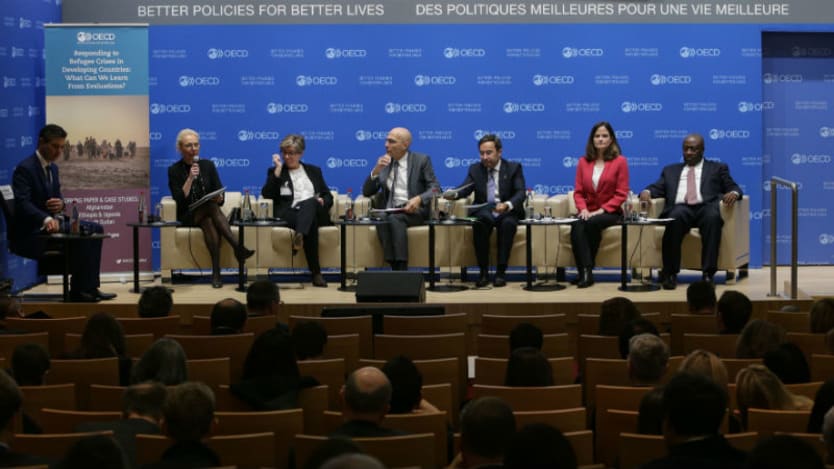
The World Food Programme chief sounds the alarm on the Democratic Republic of Congo, aid organizations look in the mirror as #MeToo messages of sexual harassment reverberate, and U.S. congressional members call for more information about President Donald Trump’s big reorganization plans. This week in development.
The committee that sets rules around how official development assistance can and cannot be spent met in Paris this week to consider a handful of hotly debated questions. The Organisation for Economic Co-operation and Development’s Development Assistance Committee, which operates by consensus, reached an agreement on clarifying the rules for donors’ use of ODA for in-country spending on refugees. The DAC sharpened rules excluding certain refugee-related costs — such as detention centers and border security — from ODA eligibility. The committee also agreed to more detail on timelines for ODA spending on refugees; funds spent for the year after a refugee submits an application for asylum can be counted as ODA. A few other big debates around aid spending have been put on hold. The United Kingdom’s proposal to allow ODA to be spent on wealthy, but climate-vulnerable states in the wake of a natural disaster was withdrawn after it became clear that the proposal would not achieve consensus support. Discussions about regulating development assistance spending on private sector instruments — such as public-private partnerships and blended finance — was also tabled, with hopes of returning to that discussion at future DAC meetings.
The development community is facing its own issues with sexual assault and intensified scrutiny of a culture of sexual harassment in the wake of allegations against film producer Harvey Weinstein and the #MeToo social media campaign that followed. According to research from Report the Abuse, 86 percent of aid workers reported knowing a colleague who has experienced sexual violence during the course of their work. Oxfam International has recently faced allegations against seven managers, and the organization’s own reporting revealed 87 allegations of sexual exploitation by staff in 2016 and 2017. Oxfam’s leadership has described those findings as a signal that they and other charities must do more to prevent sexual assault and support survivors. They were able to do so as a result of improved reporting procedures to unearth incidences. Writing on Devex, Megan Nobert, founder of Report the Abuse who was the victim of sexual assault while on a humanitarian assignment, argued that more attention should be paid to potential perpetrators of sexual violence — to clarify unacceptable conduct and to ensure organizations take note of warning signs in their hiring practices.
U.S. congressional members put pressure on the head of the U.S. Agency for International Development to provide more information about what the Trump administration has in store for its foreign affairs agencies. At a House Appropriations subcommittee hearing on Wednesday, lawmakers from both parties decried the lack of visibility they have had into the sweeping reorganization process that Secretary of State Rex Tillerson and other Trump officials have promised. Eleven months into the administration, members of the Congress say they still are not even aware of the broad parameters of how Tillerson — and USAID chief Mark Green — plan to implement changes inside America’s “soft power” agencies. They asked Green to explain recent news — first reported by Devex — that an entire class of foreign service officer applicants received email notifications last week informing them that the positions they had applied for no longer exist. They also related concerns that USAID implementers have reported about delays and cancellations in USAID’s funding pipeline, which they have attributed to budget uncertainty. Green said he was not aware that funding was being withheld in this manner, and he promised that USAID would obligate the entirety of its budget as directed by Congress.
The head of the World Food Programme told reporters that the crisis in DRC rivals some of the worst conflicts in the world today — but has gone without significant public attention. WFP Executive Director David Beasley, who recently visited the Kasai region of the DRC, related horrific stories of violence, beheadings, and rape, and said that international intervention in the crisis now could go a long way toward forestalling an even greater crisis in the near future. Only 1 percent of the eight-month, $135 million humanitarian funding appeal for the Kasai crisis has been met. Beasley told reporters that he urged the country’s leaders to find ways to improve humanitarian access and to improve the operating environment for humanitarian organizations if they want donors to provide more support. He said he has also urged donors not to punish victims of the conflict by withholding funds due to lack of trust in DRC’s political leaders. Beasley said that the food aid system must be changed to ensure its use as a unifying force — not a weapon of war.
Join the Devex community and access more in-depth analysis, breaking news and business advice — and a host of other services — on international development, humanitarian aid and global health.


